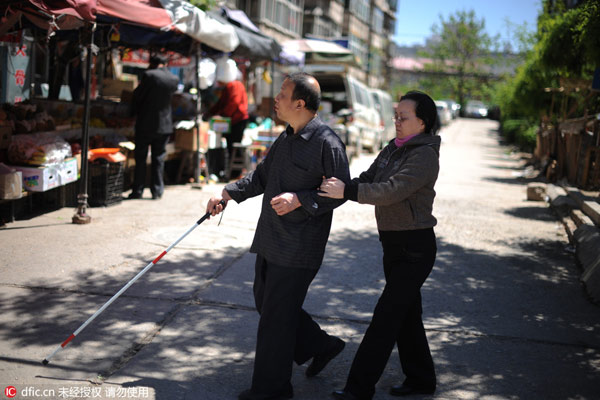
27 May, 2016
China launches app to guide visually disabled
 A couple with visual disability walk on street in Taiyuan, Shanxi province. [Photo/IC] |
The app also enables the visually disabled and volunteers to hold live video or audio chats, and volunteers can determine those who need directions.The visually disabled can book appointments through the app if they need to be accompanied, for example when catching a flight or seeing a doctor. Volunteers accompanying them must be licensed or registered with professional organizations.
The app has been jointly developed and promoted by Business for Social Responsibility, a global nonprofit organization that promotes social responsibility in business, and Beijing-based Protection and Ease Technology Co.
It is financed and managed by US telecommunications firm Qualcomm and supported by the China Academy of Information and Communication Technology.
Wang Lin, director of advisory services at Business for Social Responsibility, said, “The app aims to improve the disabled population’s quality of life and independence.”
Cao Jun, founder and president of Protection and Ease Technology Co, said, “It is the best gift for the visually disabled, including myself, on the 26th national Disabled Day.”
China’s Disabled Day fell on Sunday.
Cao gave an example of the problems that can confront the visually disabled.
“When I was young, my father told me to grab a cola from the fridge if I wanted one. He then went out. … I could not tell the difference between the bottles in the fridge and ended up grabbing a beer.”
He said that such a problem could be solved simply through the app.
According to the China Disabled Persons’ Federation, the country had 12 million visually disabled people in 2010.
In 2012, the State Council released a guideline on setting up a barrier-free environment for disabled people.
Lu Yong, deputy president of the federation, said in February that the organization and government agencies will seek further improvements on setting up such environments this year, including at airports and railway stations.
Barrier-free design refers to structures that do not impede those with special needs.



Liked this article? Share it!